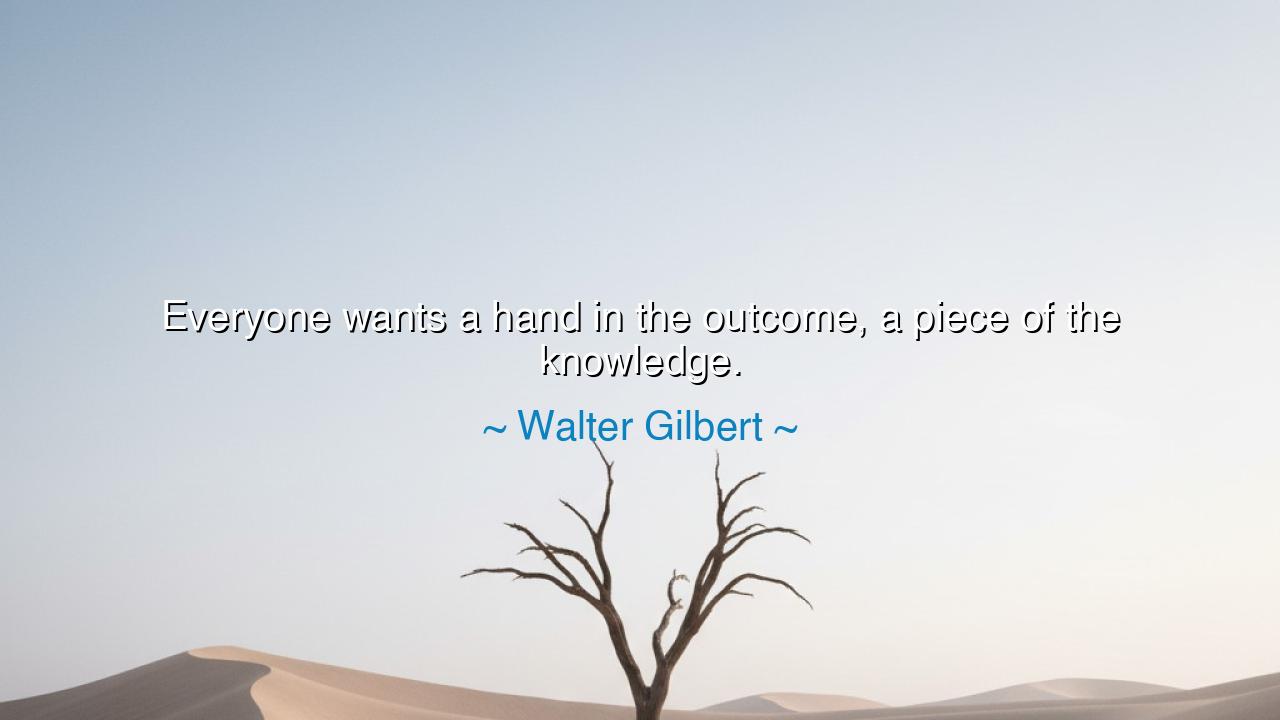
Everyone wants a hand in the outcome, a piece of the knowledge.






“Everyone wants a hand in the outcome, a piece of the knowledge.”
Thus spoke Walter Gilbert, the Nobel Prize–winning molecular biologist, whose life’s work unraveled the sacred code of life itself — the DNA that binds all creatures in a single story of creation. His words, though rooted in science, speak to something profoundly human, something ancient and eternal: the yearning to participate in understanding, to take part in the grand unfolding of truth. For in every age, whether in the temple, the observatory, or the laboratory, humanity has reached upward — seeking not only to witness the divine workings of the world, but to share in its discovery.
When Gilbert declares that everyone wants a hand in the outcome, he touches upon a deep hunger of the human spirit — the desire to belong to creation not merely as observers, but as co-creators. This is the same fire that moved the ancient philosophers of Greece, the same restlessness that led explorers across the oceans and scholars through the mysteries of the stars. To seek a piece of the knowledge is to claim one’s birthright as a thinking being, to join the eternal dialogue between mind and matter, question and revelation. It is not pride alone that drives this quest — it is love, the love of truth, of life, and of one’s place within it.
The origin of this quote lies in Gilbert’s world — the world of modern genetics, where scientists sought to decode the language of life itself. During the late twentieth century, humanity embarked upon a project unlike any before it: the Human Genome Project, the monumental effort to map every gene that shapes human existence. Nations, laboratories, and minds from across the earth joined in this sacred enterprise. And in this gathering of intellects, Gilbert saw a reflection of something greater — that no single person or nation could own knowledge; that truth belongs to all who seek it. “Everyone,” he said, “wants a hand in the outcome.” For knowledge, once found, becomes a shared light, and its flame grows brighter as it is passed from one soul to another.
This truth is not new. It echoes through history like a refrain. When Johannes Gutenberg invented the printing press, he did not only create a machine; he released knowledge from the chains of privilege. Books, once locked in the hands of the few, began to flow among the many. And as knowledge spread, revolutions of mind and spirit followed — the Reformation, the Enlightenment, the birth of science itself. Each person, newly empowered to read, to think, to question, became a participant in the unfolding of truth. Humanity, for the first time, had a collective hand in the outcome of its destiny. And from that moment, the world would never again be silent.
Yet Gilbert’s words also carry a warning: when many hands reach for the same treasure, the danger of possession arises. Knowledge, if treated as a prize rather than a gift, can be twisted by greed. In the realm of science, nations have competed to patent genes, to claim ownership of what was born not in the mind of man, but in the design of nature. In every field — art, technology, discovery — we see this struggle: will we share our knowledge as stewards, or will we hoard it as masters? Gilbert’s wisdom calls us to remember that knowledge is not currency — it is a sacred trust. It thrives when given, it withers when hoarded.
Consider the story of Jonas Salk, who discovered the vaccine for polio — a plague that crippled the bodies of children across the world. When asked if he would patent his discovery, he replied, “Could you patent the sun?” In that moment, Salk embodied the spirit of Gilbert’s truth. He understood that knowledge, especially that which heals and uplifts, belongs to all of humanity. His gift became every man’s victory; his discovery, a collective triumph. For the one who shares knowledge gives life not only to others, but to his own spirit — and through that sharing, steals a touch of immortality.
Thus, O seeker of wisdom, remember this: to desire a piece of the knowledge is noble, but to claim ownership of knowledge is folly. Learn deeply, yes — but learn to give. Discover with passion, but share with humility. For knowledge, like light, grows only when it is spread. Be not content to stand in the shadow of others’ understanding; take your place among the seekers. But when your turn comes to hold the flame, lift it high for all to see.
For in the end, the outcome of knowledge belongs to all — to the student and the teacher, the scientist and the poet, the living and the yet unborn. Gilbert’s words remind us that every human being, by virtue of curiosity and courage, has a part to play in the grand creation of understanding. Let us, then, bind our hands not in possession, but in participation. For when all souls reach together toward truth, then knowledge itself becomes divine — and through it, humanity ascends.






AAdministratorAdministrator
Welcome, honored guests. Please leave a comment, we will respond soon